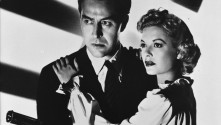Audio transcription
JOHN QUACKENBUSH 0:03
July 27, 2014, the Harvard Film Archive screened Dr. Mabuse, The Gambler. This is the audio recording of the introduction by HFA programmer David Pendleton.
DAVID PENDLETON 0:20
Good evening, ladies and gentlemen. I'm David Pendleton. I work as the programmer here at the Harvard Film Archive. And it's my pleasure to welcome all of you to a very special evening here in the Carpenter Center. We are in the midst, still near the beginning really, of our retrospective of the work of the great Fritz Lang, born in 1890 in Austria, and who died in the—I don't have the exact date in front me—the 1960s or 70s in Beverly Hills. And as those places would indicate, he divided his career between Europe and the US, and what we're going to see tonight is one of his great silent films, “super films” as they were called at the time.
The German film industry was quite healthy in the early 1920s although the rest of the German economy was mostly in ruins, and some of its star directors took to making longer and longer films, and thus it was that the film that you're about to see lasts about four and a half hours. Lang began directing films in 1919 and came to Berlin to become a filmmaker, although he'd been in France just before World War One because he wanted to become a painter—he was hoping to become an artist—and while there he fell in love with cinema. And one of the things that he fell in love with were the serials by the French director Louis Feuillade, who made in the nineteen teens, a number of remarkable serials. They were issued one episode at a time, each episode usually running about twenty minutes—fifteen to thirty minutes, let's say—called Les vampires, Fantômas, etc. about… Well, Les vampires is about a criminal gang that terrorizes Paris with crimes here and there. Fantômas is about a criminal mastermind who terrorizes Paris and who earns a nemesis in the form of Inspector Juve. And the film that we're going to see tonight is, in many ways, Lang paying tribute to Feuillade which may be one reason why the film grew so long. Like a Feuillade serial, it's often... it's a very sort of episodic narrative, although it does have an overall structure which is very much like that of Spies last night in which there is a criminal mastermind, the title character, the person investigating him, and the woman that both are in love with. Lang, of course, was part of the… according to Lang’s biographers, Lang knew the underworld in Berlin, or the demimonde let's say, in Berlin pretty well. The gambling dens, the opium dens, the sex clubs etc. And he decided that he wanted to try and create on a large canvas, on an epic canvas, a portrait of Berlin as he knew it. And so he and Thea von Harbou, who was his screenwriter for all of his silent films, pretty much almost all of his important German films before he left Germany, and who became his wife as well, chose a novel by Norbert Jacques that included this character Dr. Mabuse. In some ways, it's also Lang's response to The Cabinet of Dr. Caligari, which had been made in 1919 and which was a great success and which featured Caligari as this kind of evil mastermind who controls people's minds. But Lang was also somebody who was fascinated by technology, modern technologies of information, of communication, of transportation. And so what you'll see is somebody who both has a sort of a magic side but who also works very much through networking his influence, networking his power, and working through these technologies, extending his influence through those technologies. There was more than I was going to say, but I think maybe I'll wrap it up there. This is a long film. We'll have about a fifteen-minute break, to give our pianist a chance to rest his hands and to give all of you a chance to run to the restroom. Or if you brought some food with you for the break, to gobble that down or have a cigarette, as you wish. I’ll end by introducing the person that you'll be listening to for the next few hours. We're very fortunate to have him at our disposal when he's available. Please welcome Robert Humphreville.
[APPLAUSE]
© Harvard Film Archive















































